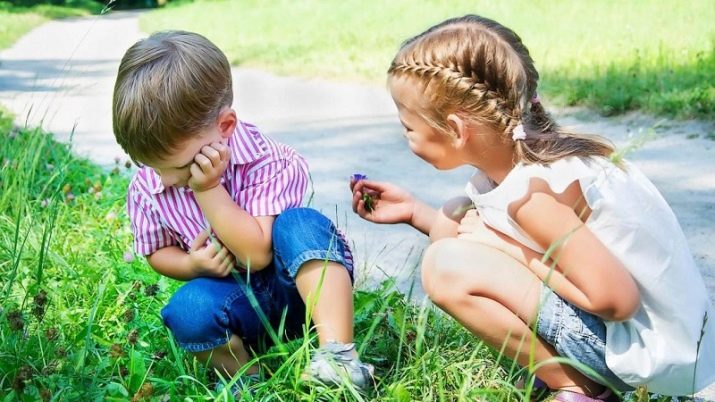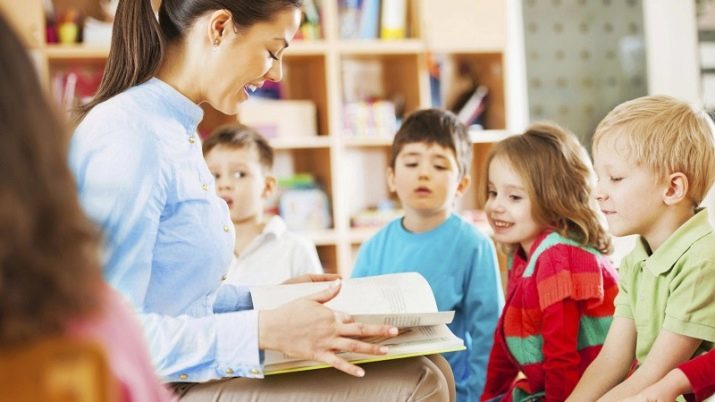Features of empathy in children and its development

Empathic processes are subordinated to the tasks of socialization at an early age. Children are able to relive in themselves someone else's experience and respond to it.

What it is?
The ability to understand the emotions and experiences of another person is called empathy. The condition can manifest itself in the form of empathy, empathy, and assistance. Empathy in children is formed in the process of learning about the world around them, oneself and other people. It occurs already in infancy. The baby smiles in response to a smile, shows a reaction to crying or exclamations of other babies. Until the age of 10, a person gains positive experience, which is later reflected in his emotional response.
- The initial stage of a baby's development is characterized by the acquisition of the ability to empathize and empathize. The baby can imagine himself in the place of loved ones.
- The second stage is associated with awareness of personal feelings and emotions. In early childhood, the baby experiences a feeling of pain when falling or upset when the mother goes somewhere, but he still cannot understand his emotions and somehow express them.
- Last but not least, an awareness of what the other person is supposedly feeling is formed. At this time, it is recommended to deal with children with different cases that happened to others or obtained from fairy tales, stories, poems, cartoons. It is necessary to discuss events in which the parents or the child himself are a participant.
It is very important to instill compassion in the baby, otherwise he will grow up to be a selfish, narcissistic person. The presence of children's empathy allows the child to successfully fit into a group of peers, work in one team and develop intellectually.An empathic person understands what is happening to others at the moment. If a child is crying or afraid, then empaths want to understand his situation, and then help the sufferer. The formation of empathy depends on the experience gained from the experiences shared with adults, the emotional contribution of the child himself, as well as on his temperament.
The relationship between temperament and empathy is especially pronounced during adolescence. Aggressive behavior of teenagers is observed mainly in choleric and melancholic people who have a low degree of empathy.

Influence of parenting
The development of responsiveness in children directly depends on the empathic attitudes of the parents. The psychological atmosphere in the family is reflected in the child's emotions. Showing love, kindness, tenderness, and affection is not enough to develop a sense of empathy. In family relationships, it is necessary to demonstrate a model of empathic manifestations. The kid should see care and sensitivity in relation to household members.
The lack of an adequate emotional response from the mother or father can slow down and even block the functional mechanisms of empathy. Adults should draw the attention of children to other people's and their own emotions. In the process of socialization, it is the parents who give the child the first empathic instructions: “Why did you push the boy? You yourself were in pain when you fell! Apologize to the boy. "
How to determine the level?
There are various methods for identifying the level of empathy formation in children. For preschoolers, they use the techniques created by G.A.Uruntaeva and Yu.A. Afonkina. One of their techniques involves the reproduction of plot scenes. Children must first portray different situations. Then they are asked how each character in the story feels. In the second stage, the participants demonstrate different emotions. The specialist processes the results obtained, identifying the degree of empathy formation in each baby.
Diagnostics in younger schoolchildren is carried out using N. Ye. Shchurkova's methodology by adding phrases like “when a person is offended in my presence, I…” or “one can be called honest who…”. A student with a misconception about humane quality gets 1 point. A child with incomplete understanding earns 2 points. Children with a clear and distinct concept of the concept are awarded 3 points.
To identify the level of emotional responsiveness of adolescents, questionnaires are used that require honest answers. The express methods of I. Yusupov, V. Boyko are popular.

How to develop?
To develop empathic feelings, psychologists advise using various exercises. In the first year of a person's life, a game of hide and seek is a useful activity. The baby always experiences vivid emotions at the sight of the parent's suddenly appearing face after a certain period of time after his disappearance. Playing "Ku-ku" helps the baby to realize that parents will appear at the right time. From one to 3 years old, it is recommended to provoke a child to search for a lost toy. At the same time, you should give the kid certain tips: "Probably, your bear is now sitting under the bed or under the table, but cannot find his way out of there." Then the baby focuses his attention not only on his own emotions, but also on the help of adults, under whose guidance he copes with distrust of the outside world.
Responsiveness can be formed in preschoolers by establishing contact with representatives of the fauna. Pets help develop a sense of responsibility and empathy in your little one. From the age of five, a child is able to smile in different ways. With the help of a smile, one must demonstrate joy when meeting a friend, depict support for a friend in trouble, express sympathy for a sick person. Psychologists recommend practicing an original greeting.For example, they offer the baby to kiss her on the cheek when he meets his mother, to shake hands with his dad, to rub his noses with his brother. Friends can be greeted with a high-five or air kiss. Preschool children should definitely read fairy tales saturated with various feelings, discuss the traits and character of the characters. It is necessary, together with the baby, to find the meaning of the fairy tale and come to some kind of conclusion. Stop while reading, ask questions like "Is it offensive to Ivanushka that he is called a fool?" or "what feelings did Cinderella feel when she sorted her groats?"
Exercise "Give an affectionate word" involves saying a pleasant phrase to the interlocutor in response to a compliment. Through this activity, children learn to show responsive attention and gift it to people. Tell your child about children without parents. Put together a package for the children in the orphanage. The development of empathy in adolescents occurs in a sincere relationship with their parents. If this contact is broken, then this circumstance negatively affects the spiritual formation of the personality.
A teenager can be taught a sense of empathy and understanding of the spiritual world of another person only with the help of trusting and friendly contact with him. In this case, it becomes possible to form a solid foundation of empathy for the rest of your life.










